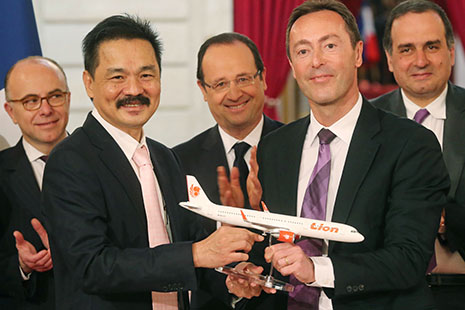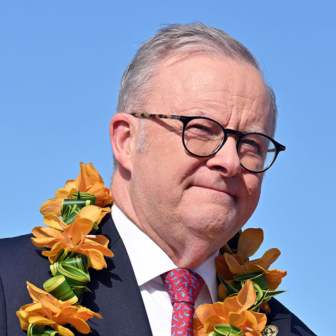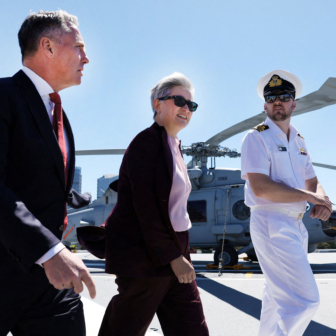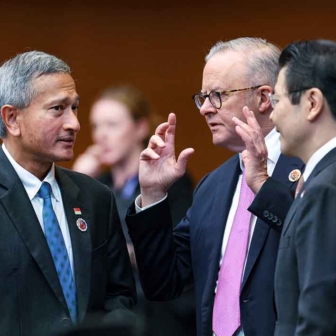IF REPUTABLE polls are to be believed, Indonesia’s Islamic parties are headed for their worst result ever in this week’s national elections, with four of the five Islamic parties predicted to lose support. According to the final pre-election surveys of Indikator and Saiful Mujani Research and Consulting, the total Islamic-party vote is 21 per cent and 24 per cent respectively, well down on the 29 per cent gained in 2009 and much lower than the 43 per cent in Indonesia’s first democratic election in 1955. Compared to their 2009 results, four of the five Islamic parties have shown falls of between 10 and 70 per cent in polls over the past eighteen months.
The one exception to this trend is the National Awakening Party, or PKB, which was founded in 1998 by Abdurrahman Wahid (“Gur Dur”), the then chair of Indonesia’s largest Islamic organisation, Nahdlatul Ulama, or NU, and later the nation’s fourth president (1999–2001). In the first post-Soeharto election in 1999, PKB gained about thirteen million votes, but this fell to just five million in 2009. Both surveys suggest PKB is likely to lift its vote to between 7.2 per cent and 8.5 per cent this week, almost double the 4.8 per cent it gained at the 2009 election. If these forecasts hold true, PKB will once again be Indonesia’s largest Islamic party – a title it hasn’t held since the 1999 election – and will be the fifth-biggest party overall.
A number of factors explain PKB’s resurgence. To begin with, for the first time in a decade the party enjoys close relations with NU. The NU chair, K.H. Said Agil Siraj, has been appearing in PKB advertisements, as have many other previously hostile NU leaders. This is a boon for the party, which draws nearly all of its support from NU’s vast membership, estimated to exceed forty million. A major part of the party’s strategy for 2014 has been to secure a much larger percentage of the NU vote, especially in NU’s populous East and Central Java heartlands. For this reason, the renewed warmth in PKB–NU relations is likely to be a major reason for the party’s rising stocks.
PKB has also been a relatively stable party over the past few years, without major graft scandals and the factional infighting that marred its preparation for the two previous election campaigns. Many of the previously disaffected ulama (Islamic scholars and leaders) who joined other parties have returned to PKB’s fold, providing a long-absent sense of unity.
The media has also made much of PKB’s recruitment of popular entertainers to its cause. Most prominent among them is Indonesia’s best-known dangdut performer, Rhoma Irama, an unlikely PKB presidential candidate whose son is a legislative candidate for the party. Another high-profile supporter is the rock singer Ahmad Dhani. While these artists have drawn big crowds to PKB campaign rallies, it is doubtful that they will swing the votes of many NU members.
But the most intriguing factor in the party’s turnaround has been the involvement of Rusdi Kirana, a Chinese non-Muslim and the boss of Indonesia’s fastest-growing airline, Lion Air. Rusdi joined the party with great fanfare in January 2014, claiming that he was a friend of the late Gus Dur and an admirer of PKB’s brand of religious pluralism. He was immediately appointed deputy chairman of the party and set about using his substantial wealth and connections to the party’s electoral advantage.
In February, Rusdi established NU–Lion, a program to direct financial assistance and economic opportunities to NU members. In the initial phase, the equivalent of several hundred thousand Australian dollars has been made available to young NU entrepreneurs, with much more ambitious disbursements and projects promised for future years. Rusdi claimed that the NU–Lion collaboration is part of his broader plan to empower and economically develop NU’s relatively deprived membership, but the hasty launch of the scheme just prior to the election suggested that it was at least partly aimed at further tightening PKB’s political ties with NU.
Rusdi appears to have poured far larger sums into direct electoral activities. He has employed Saiful Mujani Research and Consulting, which is one of Indonesia’s most highly regarded political consultancy firms, to advise PKB on its campaign, and is bankrolling a sizeable portion of the party’s advertising and on-the-ground election machinery, especially in East and Central Java. The impact of this on PKB’s campaigning has been considerable. In the previous two elections, the party ran modest and unexceptional campaigns, lacking the resources for extensive media promotion. With Rusdi’s funds, it now has high-profile marketing, with abundant billboards, electronic media advertisements, brochures and well-organised rallies and meetings. These activities have enlivened PKB’s campaign and brought renewed optimism to the party’s cadre.
Rusdi’s sudden involvement and largesse have drawn mixed responses from within the party and NU. On the one hand, in an increasingly monetised electoral environment such as Indonesia’s, having large campaign funds can be critical to increasing a party’s vote. This is especially true when, as is the case for PKB, a party lacks charismatic or highly regarded figures who might capture the public’s imagination. Proponents of a more plural and “moderate” Islamic political agenda also welcome Rusdi’s involvement on the grounds that such an intervention will help to reverse what they see as an increasingly conservative and religiously intolerant trend in Indonesian Islam in recent years, particularly during Susilo Bambang Yudhoyono’s presidency.
But many wonder about Rusdi’s motives. Despite his professed closeness to Gus Dur, most NU people admit to having never seen him in the former president’s company, though they accept his pro-pluralism stance as genuine. Rusdi appears also to be using PKB as a means to gain bragging rights over one of his rivals, the media magnate Hary Tanoesoedibjo, who joined ex-general Wiranto’s Hanura Party and quickly became its vice-presidential candidate. Rusdi has made no secret in PKB circles of his determination to see PKB win more votes than Hanura, something the polls suggest will be easily achieved.
There is also much speculation about Rusdi’s own commercial or political plans. In business circles, rumours are circulating that Rusdi may want to use his PKB connections to expand the number of routes flown by Lion Air. To gain access to more remote areas, he would require the approval of the Minister for Development of Disadvantaged Areas, a position currently held by PKB’s Helmy Faishal Zaini. Perhaps more fanciful are rumours that PKB would nominate Rusdi as transport minister in the next government, an all-too-glaring conflict of interest given that he owns a major airline. More likely is that Rusdi, like a number of other leading business people, finds it financially expedient to tie himself to one party rather than be unaligned and open to pressure from many parties for large donations. Although his PKB role obliges him to funnel money to the party, this may well be a much smaller sum than he would need to spend to keep favourable relations with the other major parties.
Last of all, some PKB and NU activists are uneasy about how Rusdi has been “parachuted” into such a senior party position. They smile wryly at his avowed desire to develop NU’s economic life and reduce poverty, asking why he had not previously shown any interest in these issues. Media reports indicate that in recent years he sought to join other parties – including Megawati’s Indonesian Democratic Party of Struggle and President Yudhoyono’s Democrat Party – but was rebuffed. Rusdi has admitted to PKB members that one reason he chose their party was because his contributions could have a big impact in NU’s needy community, which was unlikely to be the case if he joined a bigger party with many donors.
Rusdi’s role in this election also raises deeper questions about the nature of Indonesian democracy and Islamic politics. Is it a good thing for a multimillionaire to step into a middling party in which he or she has exhibited no previous interest and become one of its senior executives and major financiers? Magnates are playing an increasing role in Indonesian political parties, often shifting from one to another depending on their interests. As parties suffer growing marginalisation in the political system, their response has usually been to seek access to the financial resources they need either by holding strategic government positions or by attracting wealthy benefactors, or both. They give little attention to building membership, reforming internal structures or developing policies to deepen the party’s roots in the community and offer a clearer identity. This is particularly so for Islamic parties based, to varying degrees, on quite well-defined constituencies and sets of Islamic principles.
It is hard to avoid the impression that Rusdi’s joining with PKB is as much about ego and self-interest as it is about the admirable pursuit of pluralism and economic empowerment of poorer Indonesian Muslims. Whether this is a good or bad thing for PKB depends on how both Rusdi and the party manage the relationship. If Rusdi fails to deliver on his promises to PKB and NU, then he will have done no more than help the party secure a bigger vote at this election – a small achievement given his wealth, managerial expertise and rhetoric. If PKB and NU also fail to make good use of the resources and skills that Rusdi has provided then they will repeat the errors of other parties by just using their benefactors largely for short-term gain. •




